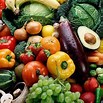
What does “organic” mean?
The term “organic” refers to the way agricultural products are grown and
processed. Specific requirements must be met and maintained in order for
products to be labeled as "organic".
Organic crops must be grown in safe soil, have no modifications, and must
remain separate from conventional products. Farmers are not allowed to use
synthetic pesticides, bioengineered genes (GMOs), petroleum-based fertilizers,
and sewage sludge-based fertilizers.
What are Genetically Modified Organisms (GMOs)
Genetically Modified Organisms (GMOs) are plants or animals whose DNA has
been altered. These products have undergone only short-term testing to determine
their effects on humans and the environment.
In most countries, organic products do not contain GMOs.
Organic livestock must have access to the outdoors and be given organic feed.
They may not be given antibiotics, growth hormones, or any animal-by-products.
The term “organic” refers to the way agricultural products are grown and
processed. Specific requirements must be met and maintained in order for
products to be labeled as "organic".
Organic crops must be grown in safe soil, have no modifications, and must
remain separate from conventional products. Farmers are not allowed to use
synthetic pesticides, bioengineered genes (GMOs), petroleum-based fertilizers,
and sewage sludge-based fertilizers.
What are Genetically Modified Organisms (GMOs)
Genetically Modified Organisms (GMOs) are plants or animals whose DNA has
been altered. These products have undergone only short-term testing to determine
their effects on humans and the environment.
In most countries, organic products do not contain GMOs.
Organic livestock must have access to the outdoors and be given organic feed.
They may not be given antibiotics, growth hormones, or any animal-by-products.

 RSS Feed
RSS Feed
